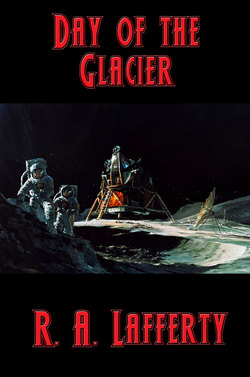Читать книгу Day of the Glacier - R. A. Lafferty - Страница 4
На сайте Литреса книга снята с продажи.
Day of the Glacier
ОглавлениеThe Fifth or Zurichthal glaciation of the Pleistocene began on the morning of April 1, 1962, on a Sunday about nine o’clock by eastern time. This was about twenty-five hours earlier than Doctor Ergodic Eimer had calculated; it threw him into panic, as his preparations were not entirely completed.
Lesser persons had been thrown into a panic nearly an hour before by a series of lesser events. And yet on an ordinary day they would have been of major magnitude.
It was that the thirty-three ICBM launching buses of the United States and Canada had been destroyed simultaneously. Full details were not immediately available, and now due to subsequent catastrophes they are lost forever.
Radio and TV news flashes tried to give a warning and fragmentary details, but on every channel and frequency the same cool voice would always cut in: “This is an April Fools Day simulated news broadcast. Do not be alarmed. This program is fictional.”
Congress had been in session for three months, and the new Peace Faction was completely dominant. As is known to all who are acquainted with Mergendal’s Law of Parliamentary Subversion, in all of the once free countries that had succumbed to the Controlled Statists (now thirty-seven) it was subsequently discovered that twenty percent of the elected had clandestinely been working for the Controlled Statists all along; that sixty percent had no true principles or basis of belief of any sort and no practical aim except to be on the winning side, and that a final twenty percent were to some degree die-hards, more or less devoted to the old way.
*
Incidentally, at this moment the latter percent had virtually ceased to exist. A series of nearly one hundred mysterious early morning murders in Washington, Chevy Chase, Silver Spring, New York and other not-too-widely scattered locations had done for most of them. This was not widely known even now, several hours later; although curiously the accounts of several of their deaths were in the Metropolitan papers before they happened. In the case of one, at least, it did not happen at all; he had forewarning and was miles away at the time of the attempt.
It had been unseasonably warm and dry for six weeks, for which reason nearly everyone except Doctor Ergodic Eimer and his cronies were surprised by the sudden chill and quick heavy snow.
They were in feverish preparation, having to telescope many hours of work into one. When they got to the airport, three inches of snow had already fallen, and it was as though it had only begun. They left quickly in three chartered planes, the last ever to leave there.
In the great cities of the Eastern Seaboard, only a little over five inches of snow fell in the first hour; but in the second hour more than seventeen. Many people of the nation seeing the fantastic accumulation simply went to bed for the day. And millions of them stayed there till they died; there was no way out.
America died that week except for a few lingering communities on the Gulf of California, and the lower Mexican deserts, and the snow dusted Indies. Europe died, and most of Asia, and the southern continents froze from the bottom up. Melbourne and Sydney and Port Elizabeth were buried, as well as Buenos Aires; and even Rio right on the tropic had seven feet of snow.
*
“The last time it happened,” said Doctor Eimer, “the Padiwire Valley was a good place. We know this from our previous studies and our preparatory expedition there last year.”
“Who would have thought,” asked Professor Schubert, “that an ice age could have come so suddenly?”
“Apparently only myself,” replied the good doctor. “I told everybody worth telling but had very little response for my trouble. It isn’t as though we haven’t had four very recent ones to study. It isn’t as though it weren’t written plainly in the rocks for everyone to see. Though I must say,” he continued as he shivered in his great coat, “that this was a mighty short inter-glacial—actually less than twenty thousand years of what we might call really nice weather.”
